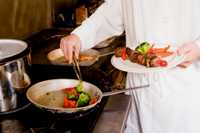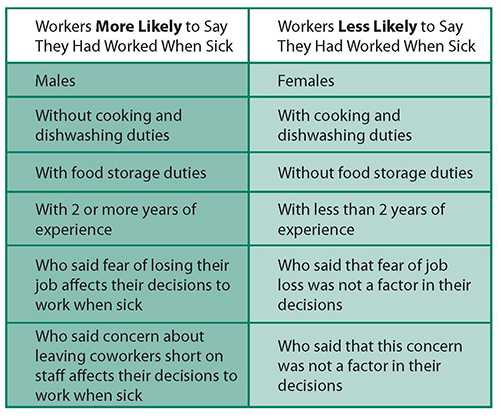Factors Linked with Food Workers Working When Sick
This page shows the study purpose, method, results, conclusions, and recommendations in plain language for the EHS-Net project titled Food Worker Experiences With and Beliefs about Working While Ill.
The findings and recommendations from this project are also in fact sheet format [PDF - 395 KB].
Citations for more EHS-Net publications are available by Study Topic or by Citation.

Study Problem
Sick food workers have been linked with past foodborne illness outbreaks. The U.S. Food and Drug Administration (FDA) recommends that food workers not work when sick with symptoms of foodborne illness. Such symptoms include vomiting and diarrhea.
We don’t know how often food workers follow the FDA advice. If we learn more about which food workers are likely to work when they are sick, we can make recommendations to stop them from working when sick. Lowering the number of workers who work when they are sick can reduce the number of foodborne illness outbreaks.
Study Purpose
The purpose of this study was to describe traits of food workers who have worked when sick with vomiting or diarrhea.
Study Findings in Brief
EHS-Net found that groups of food workers were more likely than others to say they had worked a shift in the past year when sick with vomiting or diarrhea.
Study Method
State or local environmental health specialists interviewed 491 food workers in 391 restaurants. These restaurants were in the 2008 EHS-Net sites, and we chose them at random.
We asked food workers about their traits, job duties, experience, and factors that affect their decisions to work when sick. We also asked if they had worked a shift in the past year when sick with vomiting or diarrhea.
Study Results
Some groups of food workers were more likely than others to say they had worked a shift in the past year when sick with vomiting or diarrhea:

Study Conclusions
Our findings suggest that many things affect whether workers work when sick with vomiting or diarrhea. These things include
- Personal traits (gender, job experience).
- Financial concerns (fear of job loss).
- Social concerns (worry about coworkers).
EHS-Net Recommends
Food safety programs should stress that food workers should not work when they are sick. Programs need to know and address what factors affect workers’ decisions to work when sick before they can lower the number of workers who work when sick. For example, restaurant practices that ensure adequate staffing if a worker is sick could reduce the number of workers who work when they are sick.
Key Terms
- Environmental health specialists: public health workers who enforce health and safety standards related to food and other consumer products.
- Foodborne illness: an illness caused by germs in food.
- Foodborne illness outbreak: when two or more people have the same sickness after eating food from the same place.
- Page last reviewed: August 12, 2013
- Page last updated: August 16, 2016
- Content source:


 ShareCompartir
ShareCompartir